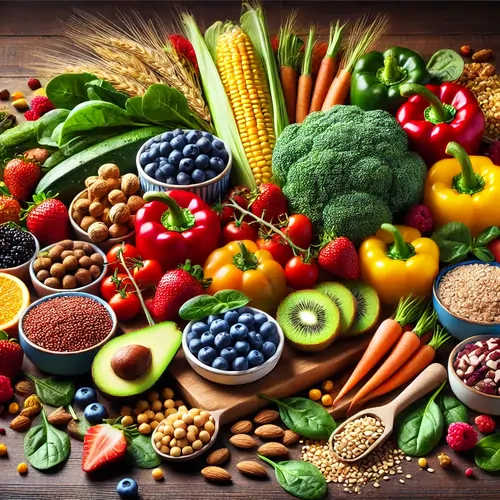
🌱 All About Vegan Food: Your Ultimate Guide to Plant-Based Eating
Losing weight through a calorie deficit is a proven strategy, and with the right meal plan, you can achieve your goals while still enjoying a variety of tasty and nutritious foods. The key to a successful calorie deficit is consuming fewer calories than your body needs to maintain its current weight. In this guide, we will help you craft a well-balanced meal plan that provides all the essential nutrients, keeps you full, and supports your weight loss journey.
Table of Contents
🥦 What is Vegan Food? A Plant-Based Primer
Vegan food excludes all animal products, including meat, dairy, eggs, and honey. This means that a vegan diet is entirely plant-based, focusing on fruits, vegetables, grains, nuts, seeds, and legumes.
Differences from Vegetarianism
While vegetarians avoid meat, they may still consume dairy products and eggs. In contrast, vegans eliminate all animal-derived foods and products, extending their ethical stance to non-food items as well, such as clothing and cosmetics that involve animal testing.
💪 Why Choose Veganism? The Health and Ethical Benefits
Many individuals choose veganism for a variety of reasons:
- Health Benefits: A vegan diet can lead to numerous health benefits, including lower cholesterol levels, reduced blood pressure, and a decreased risk of chronic diseases like heart disease, diabetes, and certain cancers. Research has shown that vegans tend to have lower body mass indexes (BMIs) compared to omnivores.
- Environmental Sustainability: Animal agriculture is a significant contributor to greenhouse gas emissions, deforestation, and water pollution. By choosing a plant-based diet, individuals can significantly reduce their environmental footprint.
- Ethical Considerations: Many people adopt a vegan lifestyle to advocate for animal rights. By avoiding animal products, they take a stand against the cruelty and exploitation that often occurs in the farming industry.
🍃 Health Benefits of a Vegan Diet
A well-planned vegan diet offers numerous health advantages:
- Nutritional Power: Vegan diets are typically high in fiber, antioxidants, vitamins, and minerals. They include a variety of fruits and vegetables that provide essential nutrients while being low in calories.
- Weight Management: Studies suggest that vegans tend to have lower calorie intake and healthier body weights. The high fiber content in plant-based foods promotes satiety, helping individuals feel full longer.
- Improved Heart Health: Plant-based diets are linked to reduced risk factors for heart disease. The absence of saturated fats found in animal products and the presence of heart-healthy fats from nuts and seeds contribute to cardiovascular health.
- Digestive Health: High fiber intake improves gut health by promoting regular bowel movements and feeding beneficial gut bacteria.
- Myth-Busting Misconceptions: It’s a common misconception that vegan diets lack protein. In reality, numerous plant-based foods provide adequate protein, and various combinations can ensure all essential amino acids are consumed.
ADVERTISEMENT

🌟 Essential Nutrients in a Vegan Diet
While a vegan diet can be very nutritious, it’s crucial to pay attention to specific nutrients that may require more consideration:
- Protein Power: Essential for muscle repair and growth, protein can be obtained from sources like:
- Legumes: Lentils, chickpeas, black beans.
- Tofu and Tempeh: Versatile soy products high in protein.
- Quinoa and Amaranth: Whole grains containing all nine essential amino acids.
- Vitamin B12: Since B12 is primarily found in animal products, vegans should seek fortified foods (like some plant milks and breakfast cereals) or take a B12 supplement.
- Iron: Plant-based iron (non-heme iron) is less easily absorbed than iron from meat (heme iron). Combine iron-rich foods (like lentils and spinach) with vitamin C-rich foods (like bell peppers and oranges) to enhance absorption.
- Calcium: Important for bone health, calcium can be found in fortified plant milks, tofu, leafy greens, and almonds.
- Omega-3 Fatty Acids: Found in flaxseeds, chia seeds, and walnuts, omega-3s are essential for heart health and brain function.
🍲 Types of Vegan Diets
Veganism can take on different forms, allowing individuals to choose what best fits their lifestyle:
- Whole-Foods Vegan Diet: Focuses on whole, minimally processed foods. This diet is rich in nutrients and typically involves plenty of fruits, vegetables, whole grains, and legumes.
- Raw Vegan Diet: Comprises raw fruits, vegetables, nuts, and seeds, usually not heated above 118°F (48°C) to preserve enzymes and nutrients.
- 80/10/10 Diet: A low-fat, high-carb diet that emphasizes raw fruits and vegetables, with a small amount of nuts and seeds.
- Junk Food Vegan Diet: This approach includes more processed vegan foods, such as vegan cookies, chips, and mock meats. While convenient, it’s important to balance these with whole, nutrient-dense foods.
🍽 Easy Vegan Recipes to Get Started
Trying new vegan recipes is a great way to explore plant-based eating. Here are some simple yet delicious options:
🌅 Breakfast Ideas
- Overnight Oats: Mix rolled oats with almond milk, chia seeds, and your choice of fruits for a quick and nutritious breakfast.
- Tofu Scramble: Sauté crumbled tofu with vegetables and spices for a satisfying, egg-free breakfast.
🥗 Lunch Options
- Chickpea Salad Sandwich: Mash chickpeas with avocado, add diced celery and onions, and serve on whole-grain bread.
- Quinoa Bowl: Combine cooked quinoa with mixed veggies, black beans, and a tahini dressing for a filling lunch.
🍛 Dinner Favorites
- Lentil Curry: Cook lentils with coconut milk, diced tomatoes, and curry spices for a hearty meal.
- Stuffed Bell Peppers: Fill halved bell peppers with a mixture of rice, black beans, corn, and spices, then bake until tender.
🍪 Snacks and Desserts
- Energy Balls: Blend oats, peanut butter, and dates, roll into balls, and refrigerate for a quick snack.
- Chia Pudding: Combine chia seeds with almond milk and let sit overnight; top with fresh fruit in the morning

🌱 Tips for Transitioning to Veganism
Making the switch to a vegan lifestyle can be a fulfilling journey. Here are some tips to ease the transition:
- Start Slowly: Introduce vegan meals gradually. Consider having a “Meatless Monday” or substituting one meal per day with a vegan option to ease into the lifestyle.
- Find Tasty Substitutes: Experiment with plant-based alternatives for your favorite foods. There are countless brands offering vegan cheese, ice cream, and even bacon, making it easier to transition without feeling deprived.
- Explore Flavors: Discover the world of spices, herbs, and cooking techniques. Try using fresh herbs, spices, and healthy fats (like olive oil and avocado) to add flavor and richness to your meals.
🌾 Common Vegan Substitutes
Having knowledge of substitutes can make transitioning to a vegan diet smoother:
- Dairy Alternatives: Explore a range of plant-based milks (almond, soy, oat, cashew) and yogurts. Vegan cheeses made from nuts or soy can also be great additions.
- Meat Substitutes: Incorporate various sources of plant-based protein, including:
- Tofu: Great for absorbing flavors and versatile in cooking.
- Tempeh: Fermented soy product that adds a nutty flavor and texture.
- Lentils and Beans: Nutritious, filling options that can be used in countless dishes.
- Egg Replacements: For baking, use flaxseed meal mixed with water or mashed bananas as a substitute. For scrambles, tofu works wonders.
- Honey Alternatives: Replace honey with maple syrup, agave nectar, or date syrup to satisfy your sweet tooth.
👩🍳 Vegan Cooking Basics
Understanding some basics of vegan cooking can elevate your meals:
- Balancing Flavors: Master the art of combining sweet, salty, sour, and umami flavors to create satisfying dishes. Use lemon juice, vinegar, or tamari to add depth to your meals.
- Vegan Pantry Essentials: Stock up on staples like:
- Legumes: Beans, lentils, and peas.
- Whole Grains: Brown rice, quinoa, oats, and whole grain pasta.
- Nuts and Seeds: Almonds, chia seeds, sunflower seeds, and walnuts.
- Spices and Herbs: Garlic, ginger, turmeric, cumin, and fresh herbs.
- Rich, Satisfying Dishes: Incorporate plant-based fats such as coconut milk or avocado to create creamy textures in soups and sauces. Roasting vegetables can enhance their flavors and add sweetness.
🌍 Veganism and Sustainability
Adopting a vegan diet can have a significant positive impact on the environment:
- Environmental Impact: The livestock industry is one of the largest contributors to greenhouse gas emissions. By choosing a vegan diet, you can help reduce the demand for resource-intensive animal farming.
- Animal Welfare: Many people choose veganism to advocate for animal rights, reducing the demand for practices that exploit and harm animals in the farming industry.
🔑 10 Key Takeaways
- Veganism avoids all animal products, offering health, environmental, and ethical benefits.
- A well-planned vegan diet is nutrient-dense and can support a healthy lifestyle.
- Protein sources include legumes, tofu, tempeh, and whole grains.
- Key nutrients to monitor are Vitamin B12, iron, and calcium.
- Veganism includes various diet types, from whole-food to raw vegan.
- Simple vegan meals are accessible and delicious.
- Gradual transition to veganism can lead to better long-term habits.
- Plant-based substitutes make veganism easier and enjoyable.
- Veganism supports sustainability and animal welfare.
- Try experimenting with one new vegan recipe each week for a fun approach!
🌈 Conclusion
Embracing a vegan lifestyle offers a wealth of benefits—from improving personal health to making a positive impact on the planet. The versatility of plant-based foods ensures that there are countless delicious recipes and meal ideas to explore. Whether you’re looking to go fully vegan or simply incorporate more plant-based meals into your diet, the journey can be rewarding and enjoyable. Start by experimenting with new recipes, and consider adopting a few meatless meals each week.
With the right resources and mindset, you can embark on a fulfilling plant-based journey that enriches your life and supports the world around you. Happy eating! 🌟
🤔 Frequently Asked Questions (FAQs)
Is a vegan diet healthy for everyone?
Generally, yes, a vegan diet can be healthy for most people, but it is important to plan meals properly to avoid deficiencies.
Can you get enough protein on a vegan diet?
Absolutely! Many plant-based foods provide ample protein, and a varied diet ensures all essential amino acids are consumed.
Is vegan food more expensive?
It can be, but it often depends on your choices. Staples like beans, grains, and vegetables can be quite budget-friendly.
Can children follow a vegan diet?
Yes, children can thrive on a vegan diet with appropriate planning and guidance from a healthcare provider.
How do I avoid deficiencies on a vegan diet?
Eating a variety of foods and considering supplements (especially for B12) helps meet nutrient needs.
ADVERTISEMENT

We Also Recommend:
- JILIVIP App
- JILIVIP Bonus
- JILIVIP Login
- GXGWin Casino
- GXGWin Bonus
- GXGWin Register
- PHWin Login
- PHWin Bonus
- PHGinto
- JK4 Casino Online
- GXGWin App
- 9KSLOT Casino
- WinPH Casino
- 88Casino Royale
- PHGinto Login
- GXGWin Login
- 9KSLOT Login
- PHRoyal777 Casino
- YAMAN777 Gaming Casino
- GXGWin Register
KEYWORDS: Vegan Food

Ghen is a skilled SEO specialist in the online gaming industry, known for boosting organic traffic and engagement. With expertise in keyword research, content optimization, and link building, she helps gaming platforms achieve and maintain top search rankings.






